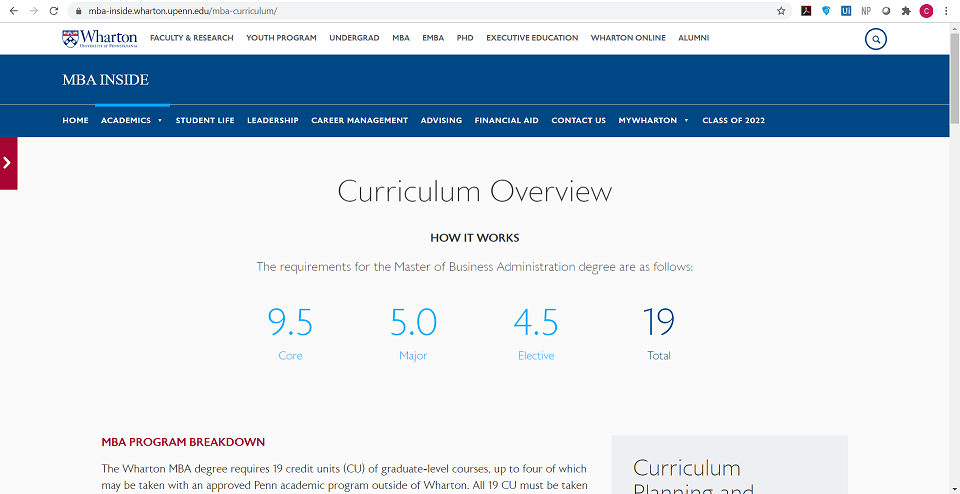Now that you’ve confirmed that you’re ready for school, it’s time to select the schools you would apply to. Generally, I would advise keeping it to a maximum of 4 – 6 schools so you do not overload yourself, burnout and hurt the overall quality of your applications.
You should start by making a short list of schools that you’re interested in, and then do some further research to narrow that list down. School rankings are a good place to start and can provide a snapshot of what different schools have to offer. Forbes and the Financial Times rank Business Schools annually by various criteria and are some of the most popular Business School rankings.
So, what are some of the things that you should consider when you’re deciding on which schools to apply to? It really depends on your specific motivations for going to Business School and which schools can deliver on your expectations, but here are some general factors that may be helpful to consider:
1. Curriculum:
Some MBA programs give students the opportunity to focus on certain subjects, which they usually refer to as “tracks”. On the other hand, some programs are just general MBA programs (e.g. Harvard). If specializing in a “track” is something that is important to you, you should target schools that offer those courses you are interested in. For instance, Wharton’s analytics track was one of my major motivations for applying there.
You should also check the structure of the program curriculum. Some offer more flexibility than others and may appeal to people who would like to customize their own curriculum. Chicago Booth’s flexible curriculum is one of its key value propositions.

2. Length of program:
Does being out of the workforce for two years sound ludicrous to you? Then you may want to limit your search to schools that offer a one-year MBA program. Though more common in Europe, an increasing number of top schools in the US such as Kellogg, Columbia and Cornell offer one-year MBAs.
Both formats offer distinct advantages. For instance, people enrolled in the one-year format spend less time out of the labour market, and spend less money, since they only have to pay one year’s worth of tuition and living expenses. On the other hand, they may be missing the summer internship which is usually a key component of the two-year programs. One-year programs also typically tend to be more intense than their two-year counterparts, as the curriculum is condensed, and some programs even require applicants to possess a certain level of business knowledge to be eligible to be accepted.
Be sure to weigh the pros and cons of both formats before deciding.
3. Internship opportunities:
The MBA summer internship is a major pipeline for students looking to land job offers in a new company or industry post-MBA. If you are an international student hoping to land a job abroad, it is even more crucial to attend a program that gives you the opportunity to complete an internship (though, of course, it is not impossible to land a job without one). So, make sure to look out for this while doing your research.
4. Career services:
This is typically not a problem for any of the top Business Schools as they tend to have well-equipped career services offices that help prepare students for their chosen post-MBA careers. That said, you may want to find out the extent of support provided – e.g. resume reviews, interview prep, making alumni connections, crafting your career strategy, etc. You may also want to know what companies typically recruit on campus and how recruiting is generally conducted. As always, check the school website to see what information they have on this, and reach out to students/alumni or the school if you have further questions.

5. Funding:
You do not want to get into your dream school, and then have to pass on it because you cannot afford to pay.Find out what the funding options are for your target schools. Schools typically have information on their website on the financial aid options they offer. You can also look out for external scholarship opportunities and loan providers and be sure you can potentially access these if you get into your target schools. On the other hand, if your bank account is overflowing, please skip this step 😊.

6. Alumni network:
One of the best things about Harvard Business School – and the reason I only apply to top schools (I do not believe in safety schools) – is the indisputably high-quality alumni network. Business school may last for only 1 – 2 years, but you become part of that community for a lifetime. You want a school that has diverse, responsive and influential alumni.
7. Location:
Location may not be a major factor for everyone, but it can be important when thinking about career opportunities and relocation prospects. For instance, some industries have geographical hubs (e.g. Silicon Valley), and schools located around those hubs may be attractive to students who want to pursue career opportunities in that industry. On a broader note, you should also look at the immigration policies of your target country, especially if you wish to live and work there post-MBA.
Most schools usually have tons of information on their website about their programs, so make sure you digest all you can from there. Attend information sessions for the schools you’re interested in. If you cannot attend in person, check if the school holds virtual ones that you can benefit from. Do not be shy to shoot the admissions office an email if you have specific questions that are not answered online. Speak to current or past students, if you know any, or reach out on social media and ask about their experience.
If you have questions, drop a comment below or shoot me an email at hello@chiamakaokoye.com and I will try my best to provide guidance or point you to appropriate resources.

